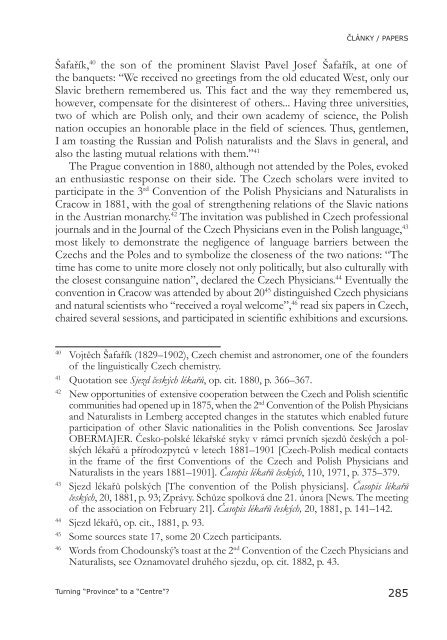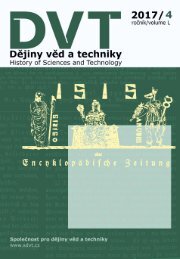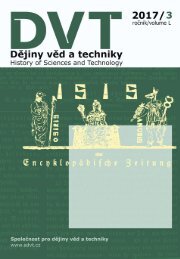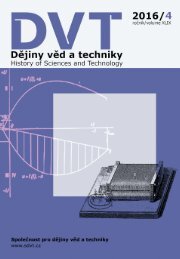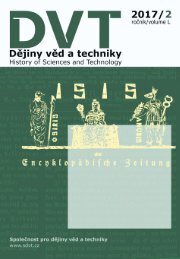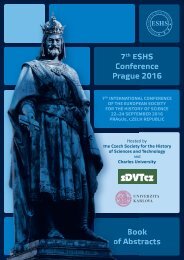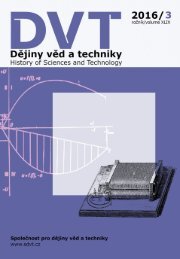Dějiny věd a techniky 2015, 4
Číslo je věnováno 7. mezinárodní konferenci Evropské společnosti pro dějiny vědy, která se konala 22.–24. září 2016 v Praze.
Číslo je věnováno 7. mezinárodní konferenci Evropské společnosti pro dějiny vědy, která se konala 22.–24. září 2016 v Praze.
Create successful ePaper yourself
Turn your PDF publications into a flip-book with our unique Google optimized e-Paper software.
ČLÁNKY / PAPERS<br />
Šafařík, 40 the son of the prominent Slavist Pavel Josef Šafařík, at one of<br />
the banquets: “We received no greetings from the old educated West, only our<br />
Slavic brethern remembered us. This fact and the way they remembered us,<br />
however, compensate for the disinterest of others... Having three universities,<br />
two of which are Polish only, and their own academy of science, the Polish<br />
nation occupies an honorable place in the field of sciences. Thus, gentlemen,<br />
I am toasting the Russian and Polish naturalists and the Slavs in general, and<br />
also the lasting mutual relations with them.” 41<br />
The Prague convention in 1880, although not attended by the Poles, evoked<br />
an enthusiastic response on their side. The Czech scholars were invited to<br />
participate in the 3 rd Convention of the Polish Physicians and Naturalists in<br />
Cracow in 1881, with the goal of strengthening relations of the Slavic nations<br />
in the Austrian monarchy. 42 The invitation was published in Czech professional<br />
journals and in the Journal of the Czech Physicians even in the Polish language, 43<br />
most likely to demonstrate the negligence of language barriers between the<br />
Czechs and the Poles and to symbolize the closeness of the two nations: “The<br />
time has come to unite more closely not only politically, but also culturally with<br />
the closest consanguine nation”, declared the Czech Physicians. 44 Eventually the<br />
convention in Cracow was attended by about 20 45 distinguished Czech physicians<br />
and natural scientists who “received a royal welcome”, 46 read six papers in Czech,<br />
chaired several sessions, and participated in scientific exhibitions and excursions.<br />
40<br />
Vojtěch Šafařík (1829–1902), Czech chemist and astronomer, one of the founders<br />
of the linguistically Czech chemistry.<br />
41<br />
Quotation see Sjezd českých lékařů, op. cit. 1880, p. 366–367.<br />
42<br />
New opportunities of extensive cooperation between the Czech and Polish scientific<br />
communities had opened up in 1875, when the 2 nd Convention of the Polish Physicians<br />
and Naturalists in Lemberg accepted changes in the statutes which enabled future<br />
participation of other Slavic nationalities in the Polish conventions. See Jaroslav<br />
OBERMAJER. Česko-polské lékařské styky v rámci prvních sjezdů českých a polských<br />
lékařů a přírodozpytců v letech 1881–1901 [Czech-Polish medical contacts<br />
in the frame of the first Conventions of the Czech and Polish Physicians and<br />
Naturalists in the years 1881–1901]. Časopis lékařů českých, 110, 1971, p. 375–379.<br />
43<br />
Sjezd lékařů polských [The convention of the Polish physicians]. Časopis lékařů<br />
českých, 20, 1881, p. 93; Zprávy. Schůze spolková dne 21. února [News. The meeting<br />
of the association on February 21]. Časopis lékařů českých, 20, 1881, p. 141–142.<br />
44<br />
Sjezd lékařů, op. cit., 1881, p. 93.<br />
45<br />
Some sources state 17, some 20 Czech participants.<br />
46<br />
Words from Chodounský’s toast at the 2 nd Convention of the Czech Physicians and<br />
Naturalists, see Oznamovatel druhého sjezdu, op. cit. 1882, p. 43.<br />
Turning “Province” to a “Centre”?<br />
285


